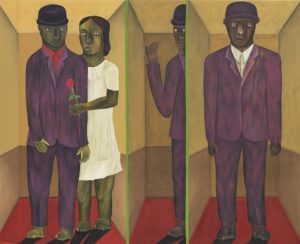
Salah Elmur: Pink Circles
Until 14 March 2020, Gallery MOMO, Cape Town
About:
Gallery MOMO is pleased to present Salah Elmur’s solo exhibition, Pink Circles.
Pink Circles is named after a painting included in the exhibition. The large-scale work depicts two rows of men, the top row of men wear white diapers and pink circles with numbers appearing near their heads; in the lower row they wear green military uniforms and diapers with their legs exposed. A man in the lower row holds up a small mirror, in which the face of a woman appears. The pink circles are placed in the image to distract the viewers from the faces of the army generals and the oddity of the scene. The image constitutes his personal and social commentary reflecting the inequalities of modern life.
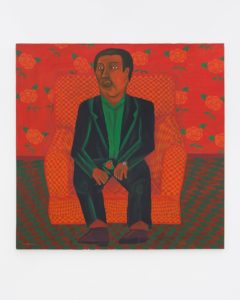
There are curtains on either side of the image framing the generals – an element Elmur borrows from studio photography. After stumbling on a box of old photographs and negatives from his grandfather and fathers Khartoum-based studio, Kamal Photography Studio, he developed an interest in photography. Although the studio was closed down before Elmur was old enough to remember, the archive of photographs continues to permeate the artists work with Elmur borrowing other elements from vintage African studio photography such as painted backdrops, checked floor patterns and the arrangement of the sitters in the typical style of family or personal photographs. Like studio portraits, the paintings are characterised by their stillness; the eyes in the image are frozen and movement is scarce.
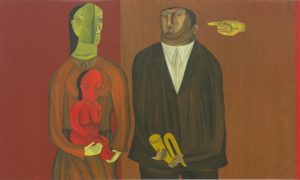
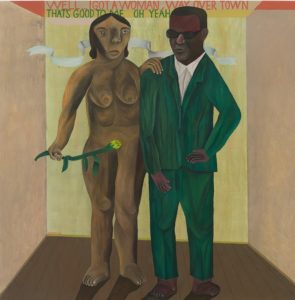
Elmur travels with his collections of photographs from old Sudan. While visiting Johannesburg one of his studio walls was covered in vintage black and white images. The other wall covered in hand-painted barbershop signs showing people wearing their hair in cornrows or a fresh high-top fade. The works in the exhibition were largely made in Johannesburg and Elmur’s experiences and observations appear in the works. He discovered the gritty city by walking the streets, visiting museums and meeting people. “Room 4” was painted after Elmur visited the apartheid museum – he uses a combination of vertical and horizontal lines to create the small jail-like spaces that the figures are locked in. It marks a break from his paintings which rarely expand from the closed room that resembles a studio.
A single flower and a woman (sometimes in the nude) appear often in the show. The flower and the woman are a motif that has occurred at various points in the Elmur’s paintings, in “Room 4”, the artist painted the flower as a salve to ease the tension of the apartheid memory. In his other paintings, the flower has multiple significances. It is a reference to his college training as an artist and the multiple nude models and still life’s of plants and objects they drew. The other significance is the link to Elmur’s “perfume period”. He paints flowers to recount the memories of the romantic period of his life – they are a bouquet for a darling and souvenirs of a beloved time.
It is not only South Africa’s idiosyncrasies that have influenced his work. Elmur has travelled the continent widely – Tanzania and Nigeria, Uganda, Somalia, Morocco and Tunisia. He lived in Kenya for four years and has been in Cairo for a decade. These places have all influenced the artist, he says that it has shown him the art and culture of diverse peoples and influenced him similarly to famous artists who borrowed from Africa. Yet Sudan remains the greatest source of creative inspiration with nostalgia and memory being placed at the centre of his practise.
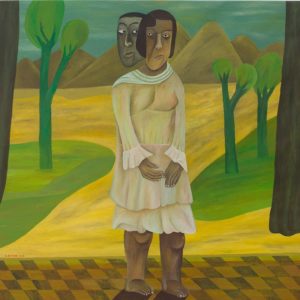
“I grew up there in my village with my family. I remember how they caught fish from the banks of the Blue Nile and how they farm. I remember how the people, live, eat, talk, dress and sing and that is my major inspiration”. He remembers all the details and they continue to stoke his memory, these images in his mind are intermingled with his observations and impressions. There are strong ties linking the works of Elmur with all these old memories, but in no way do they distance themselves from the moment he is living in. Along with photographs, his memories and travels constitute an inexhaustible fuel for his ideas, elements and the vocabulary that he uses in his paintings.
Salah Elmur is a painter, filmmaker, photographer, and illustrator. His work is included in the following collections: the Frederick R. Weisman Art Museum Collection, Minneapolis; the CCH Pounder Collection, New Orleans; the Museum of African Contemporary Art Al Maaden Collection, Marrakesh; the Sharjah Art Museum Collection, Sharjah; the Sharjah Art Foundation Collection, Sharjah
